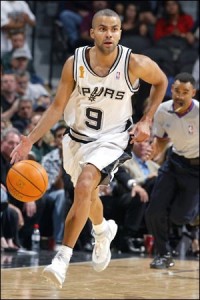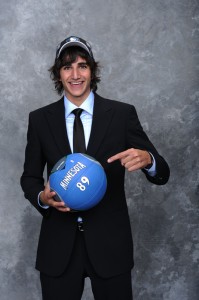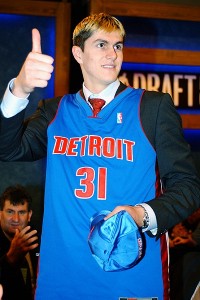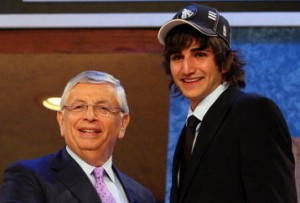With the NBA Draft right around the corner, don’t expect to hear a lot of unknown, hard-to-pronounce, foreign names called from the podium. The recent trend of a draft filled with international prospects is on the decline, but why? The past failures of teams in drafting players from overseas certainly has something to do with it.
By: David Kay
With Jan Vesely and Donatas Motiejunas choosing to withdraw from the 2010 NBA Draft, there will likely only be one foreign player selected in the first round on Thursday; France’s Kevin Seraphin. That will be a major change from recent history as every draft since 2000 has seen at least three international prospects picked in the first round.
The number of foreign players picked peaked in 2003 when an amazing 19 of the 60 selections were international prospects. Since then, the popularity of going the foreign route has decreased.
Here is the number of foreign players chosen in each NBA Draft since 1995:
1995-3
1996-5
1997-6
1998-5
1999-5
2000-9
2001-6
2002-14
2003-19
2004-15
2005-14
2006-15
2007-13
2008-11
2009-11
As you can see, from 1999-2003 the trend of taking international players almost quadrupled in just four seasons. NBA teams began putting more time, money, and resources into scouting overseas in hopes of finding the next hidden gem. But with that tactic came an incredible hit or miss result with most of the selections never panning out as hoped.

21 of those 127 players are currently solid role players. That list includes guys like Hedo Turkoglu, Luis Scola, Andrea Bargnani, Nene, and Andris Biedrins. 23 international players picked in the first round since 2000 can be categorized as busts as they never lived up to their potential or were out of the league within a couple years (see Darko, Nickoloz Tskitishvili, Yaroslav Korolev, and Saer Sene.) Seven first round picks have yet to even come to the NBA.
The odds of an international player who was selected in the second round of the draft becoming a contributor in the NBA is exponentially less. 87 foreign players were second round picks since 2000. Of those 87, 43 have never even stepped foot on the court during an NBA regular season game while 34 of them had a cup of coffee in the league but ended up returning to international ball after failing to adapt to the American style of play. That leaves ten foreign second round picks who are actually still in the league meaning on average, only one second round pick per year actually sticks in the association.
Seraphin is the only player pretty much guaranteed a spot in the first round of this year’s draft. German center Tibor Pleiss and Ryan Richards, a seven-footer out of England, are the other internationals talent who could sneak into the top 30 picks, but more than likely are selected in the second round. There are several other foreigners who will likely be chosen in the second round but it is very doubtful that the 2010 Draft will see more than eight or nine international players picked. That means this year will produce the least number of foreign draft picks since 2001, furthering the idea of this draft philosophy becoming sliding trend.
So why is the foreign appeal losing its flair?

Often times, players will have buyout clauses that are actually more expensive than the contract they would receive if they left for the NBA making it near impossible to come to the league from a financial standpoint. Many agents of foreign players actually prefer their clients be drafted in the second round so they can come to the NBA when their current contract ends and then they can sign a deal higher than what is determined by the rookie scale that first round picks receive.
So while it might be entertaining to hear Commissioner David Stern butcher some Serbian name and have random tall dudes walk out of the crowd in suits and onto the NBA Draft stage, don’t expect to see that phenomenon as much Thursday as you have in years’ past.

